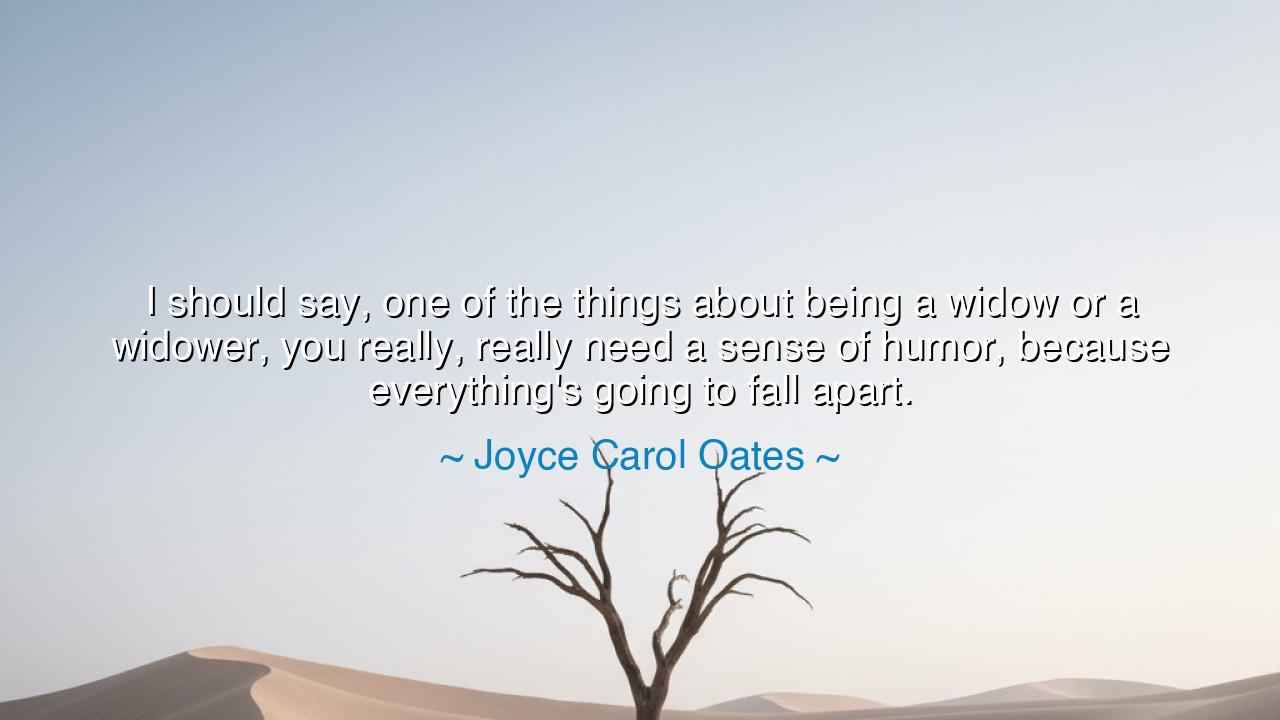
I should say, one of the things about being a widow or a widower
I should say, one of the things about being a widow or a widower, you really, really need a sense of humor, because everything's going to fall apart.






“I should say, one of the things about being a widow or a widower, you really, really need a sense of humor, because everything’s going to fall apart.” — thus spoke Joyce Carol Oates, the great weaver of words and sorrow, whose life, like her art, has gazed deeply into the chambers of human grief. In these few lines, she reveals not despair, but wisdom — the kind of wisdom born only through loss, through the quiet endurance of one who has walked among the ruins of love and lived to speak. Her words are both lament and lantern: they acknowledge that grief dismantles all that we know, and yet they offer humor as the thread by which one may begin to stitch life together again.
To lose one’s beloved is to see the world unmade. The rhythms of daily life — once guided by shared breath and routine — become hollow echoes. Every cup, every chair, every shadow reminds the heart of absence. When Oates says, “everything’s going to fall apart,” she speaks the truth that mourning is not just emotional, but structural. Grief shatters the order of existence; it rearranges time itself. Yet her counsel is not to resist this falling apart, but to survive it with humor, that ancient flame of humanity which burns even in the darkest hours.
Humor, in the face of despair, is not denial — it is defiance. It is the spirit’s refusal to let sorrow have the final word. For laughter, even a small one, is a declaration that the soul still breathes. Oates’s insight arises from her own lived pain; when her husband of forty-seven years, Ray Smith, died unexpectedly, she found herself adrift in grief’s vast sea. Through her memoir, A Widow’s Story, she revealed the unbearable weight of that solitude — and yet, in moments, her wit glimmers through. That humor was not disrespect to the dead, but an offering of survival to the living. It was the breath she took when she could no longer weep.
The ancients, too, understood this sacred balance between sorrow and laughter. The Stoics taught that even in loss, one must retain mastery of the self — not by suppressing emotion, but by meeting it with clarity and courage. Epictetus, who knew slavery and suffering, once said, “It’s not what happens to you, but how you react to it that matters.” To react with laughter, even amid grief, is to reclaim agency over life. Likewise, in the old plays of Sophocles, amid tragedy, there were always flashes of irony — for the Greeks knew that laughter was the soul’s way of bearing what reason cannot.
There is a story of Queen Victoria, who after the death of Prince Albert, withdrew into mourning for years. Her grief became her fortress, and her nation wept with her. But it was said that one day, a servant tripped and fell in her presence, scattering papers everywhere — and for the first time in years, the Queen laughed. It was a small sound, but it marked her return to life. Like Oates, she discovered that to laugh after loss is not betrayal; it is resurrection.
The origin of Oates’s truth lies not in philosophy alone, but in the raw alchemy of experience — the transformation of agony into endurance. The widow or widower stands at the edge of two worlds: one that has ended, and one that has yet to begin. Everything collapses — the body weakens, the will falters, the heart aches beyond measure. Yet humor, fragile though it seems, becomes a bridge between the two. It teaches the mourner to live again, not by forgetting, but by remembering that life, even shattered, can still be strange, beautiful, and absurd.
Let this be your lesson, O listener of life’s deeper music: when everything falls apart — as it inevitably will — do not seek to hold it all together by force. Instead, hold fast to your humor, that quiet ember of hope. Laugh through tears. Find joy not in perfection, but in persistence. When sorrow breaks you, let laughter mend you, piece by piece. For the gods themselves, said the old poets, envy not our laughter, but our ability to laugh after suffering. That is the secret strength of humankind — the power to turn pain into poetry, and grief into grace.
So remember Joyce Carol Oates’s teaching: when the world crumbles, do not despair if you find yourself laughing through your tears. That laughter is not madness; it is memory turned to light. It is life whispering to you, “You still belong here.”






AAdministratorAdministrator
Welcome, honored guests. Please leave a comment, we will respond soon